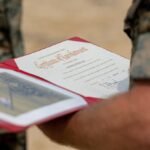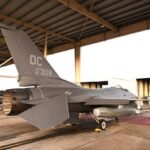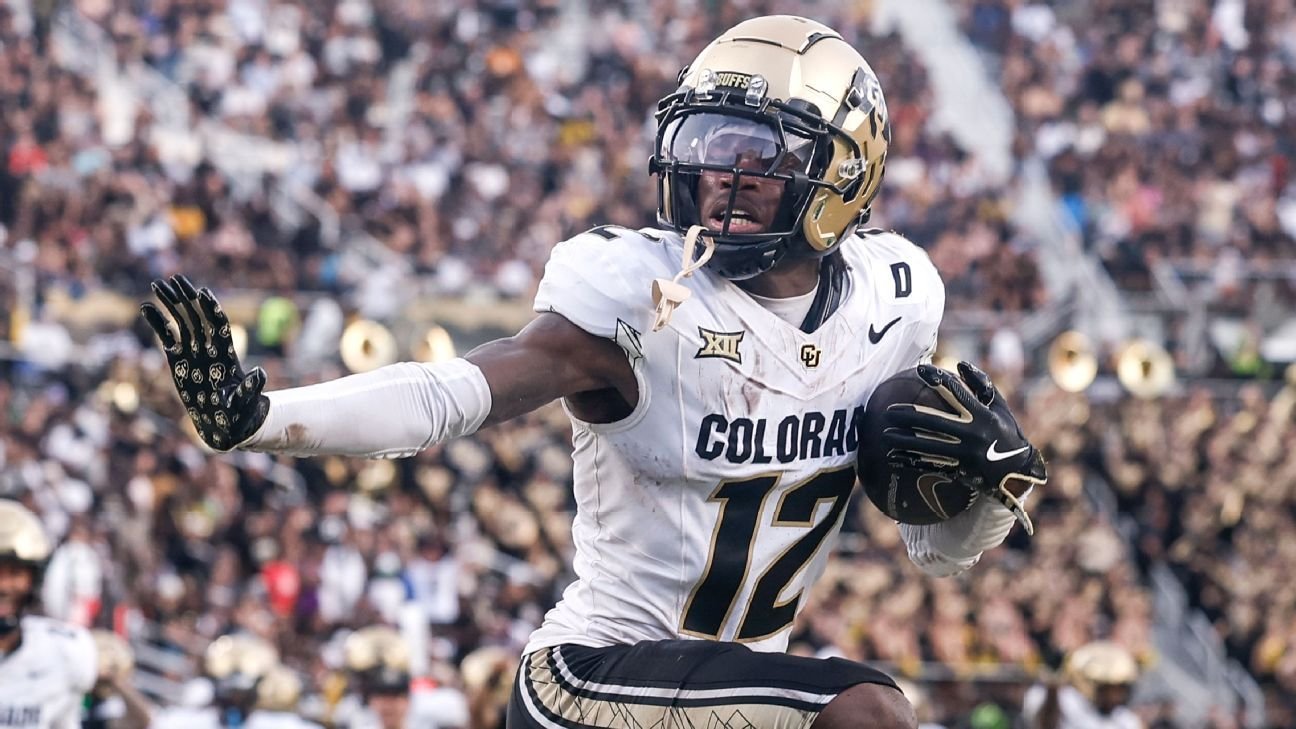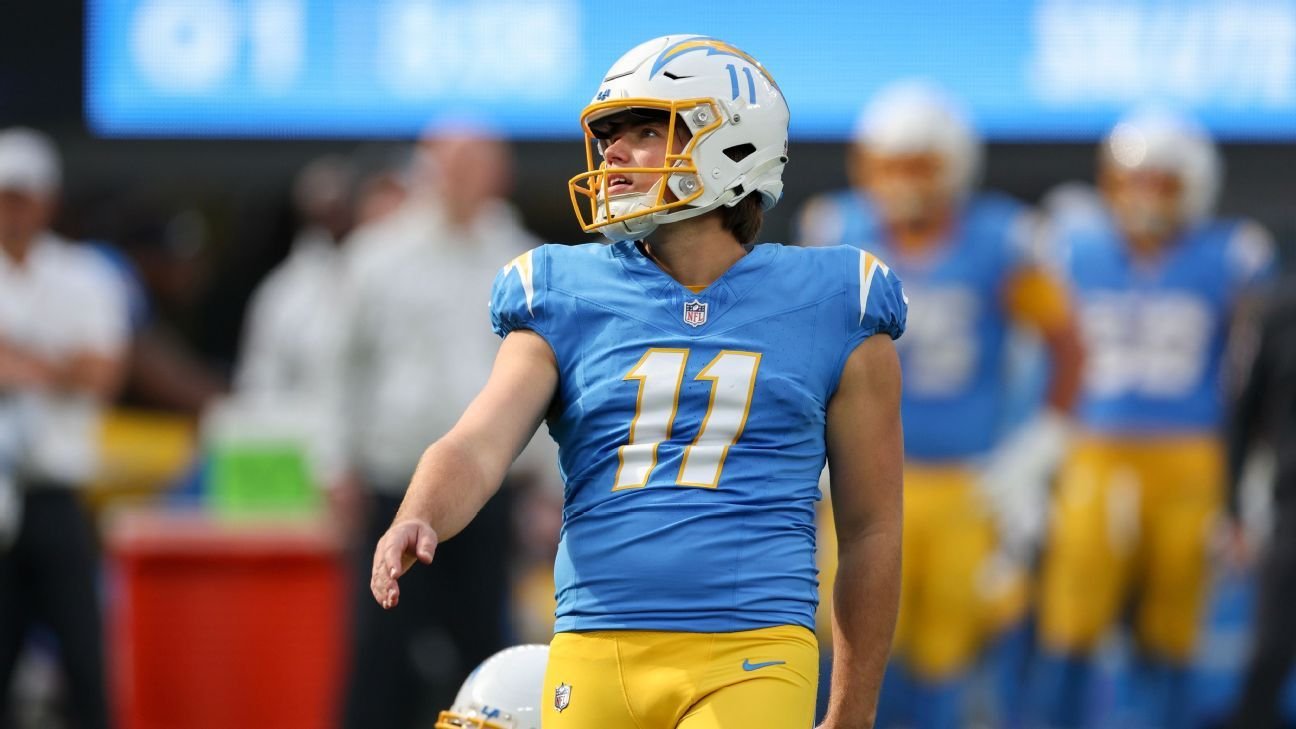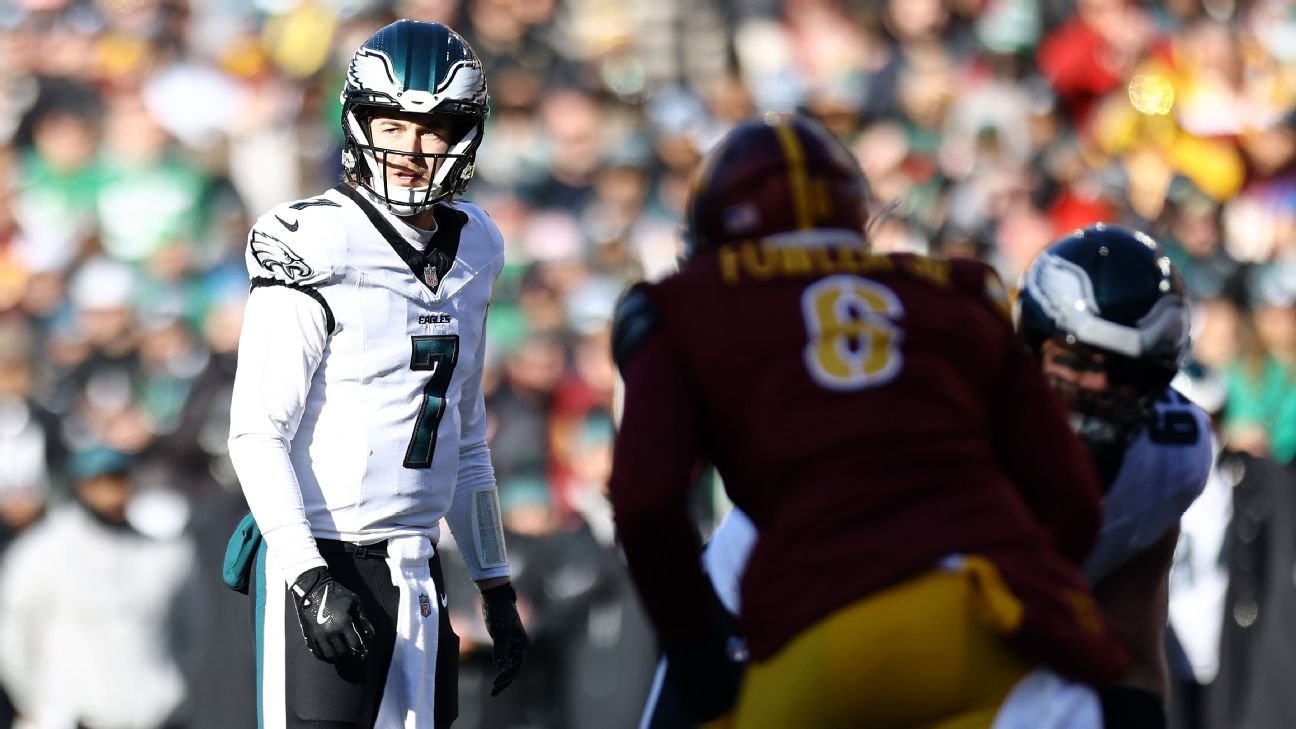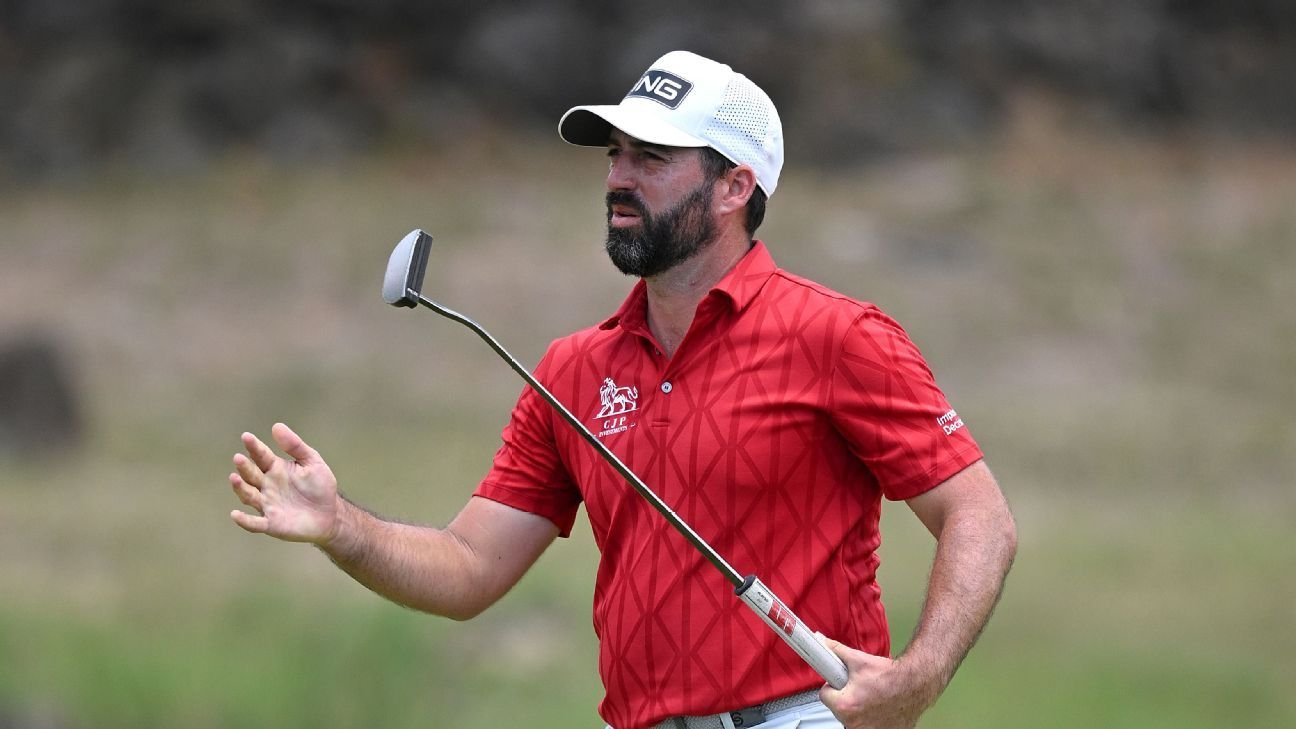Champ Bailey always keeps a keen eye out for “the Georgia guys,” players who grew up in the state or played at the University of Georgia. After all, Bailey played high-school ball in the small Georgia town of Folkston and was an All-American for the Bulldogs before his Hall-of-Fame NFL career.
This season, one of those “Georgia guys” is the Heisman Trophy favorite and a top prospect for the 2025 NFL draft — and a common comp to Bailey.
Colorado wide receiver/cornerback Travis Hunter — a native of Suwanee, Georgia — has captivated the college football landscape by dominating on both sides of the ball. On offense, Hunter has 92 catches for 1,152 yards and 14 touchdowns. On defense, he has 33 tackles, four interceptions, 10 pass breakups and a forced fumble. In Colorado’s regular-season finale against Oklahoma State, Hunter became the only FBS player over the past 25 seasons with three scrimmage touchdowns and a defensive INT in a single game, per ESPN Research.
“He’s doing things you probably won’t see again,” Bailey said.
Few can relate to what Hunter has done and will likely try to do in the NFL better than Bailey. In his final season at UGA in 1998, Bailey won the Bronko Nagurski Award as the nation’s best defensive player, picking off three passes at cornerback. But he also caught 47 passes for 744 yards and five touchdowns as a receiver in the Bulldogs’ offense. He topped 1,000 snaps that season and finished seventh in Heisman voting. But Bailey would play almost exclusively cornerback in the NFL after being drafted seventh overall by Washington in 1999, seeing nine targets at receiver over a 15-year career.
Because of his unique perspective, we asked Bailey to weigh in on what makes Hunter so special, why playing both sides of the ball is so difficult and what lies ahead for the Buffaloes’ star in the pre-draft process. Can Hunter — who could be awarded the Heisman Trophy on Saturday (8 p.m. ET on ESPN) — do something that Bailey didn’t in his NFL career and play both offense and defense at the next level? Here’s Bailey’s take, in his own words.
Jump to Bailey on:
Hunter’s immense talent
Difficulties of playing two ways
What could happen in the pros

What does Bailey see in Hunter?
The scouting reports for Hunter and Bailey read similarly, albeit 26 years apart. Hunter is listed at 6-foot-1 and 185 pounds, while Bailey measured 6-foot, 184 pounds at the 1999 combine. The two also share great speed, explosive traits and ball skills. Bailey has spent time watching Hunter play and sees a future star.
Bailey: He just loves football. You can see it by the way he plays — he’s the ultimate competitor. No player is going to last very long at one position, let alone two, if he doesn’t love the game.
Travis is probably more refined in coverage than I was at that age. He has been schooled better at this point — I mean, his coach is Deion Sanders, one of the best to ever play corner. His hands are in the right place, his eyes are in the right place, and he understands route concepts and where the ball is going. His interceptions are often because he’s going to the spot he knows where the ball is going.
The big difference between me and Travis? People could see him coming more. A lot of guys play both ways in high school, return kicks and punts, play in the band at halftime. And they get to college and the coaches who recruited them — who said they loved the versatility — now tell them the second day of camp, ‘You’re here, you’re here,’ and that’s it. But people could see Travis coming. He did it at Jackson State before transferring in 2023, and Prime said he was going to let him do it at Colorado. So there wasn’t even a question from his coach.
I kind of built up, though. I showed I could do it, played some offense my first year, some more my second year and did the whole thing my last year.
Why is playing both ways so difficult?
Hunter has played 1,380 snaps in 12 games this season, including 670 on offense, 686 on defense and 24 on special teams. That’s 382 more snaps than the next-most active player in the FBS, and he topped 100 snaps in 10 of those 12 games. It’s an incredible workload, especially when you consider Hunter had 1,007 snaps in the previous season.
The most active NFL players routinely crack 1,000 snaps in a healthy season playing on just one side of the ball, though. The two-way workload in the pros would be significantly larger, even before factoring in the off-field preparation.
Bailey: In my last season at Georgia, I returned kickoffs and punts, played corner and played wide receiver — they didn’t hold me out of anything. If the ball was out there, I was out there.
I wanted to play both sides of the ball when I got to the league, too, and had some chances to line up and play some offense. But I think the difficulty of really doing it is hard to comprehend.
As you go from high school to college, and college to the NFL, the preparation becomes a big thing for the coaches. You start playing all the snaps on one side of the ball and a lot of snaps on the other and maybe some special teams, but coaches don’t really know what you’re going through. They haven’t done it because not many have. So you’re trying to show them you’re prepared enough to be out there and that you can hold up. That takes convincing.
There isn’t enough said about the accountability that comes with what Hunter is doing, too. Playing both ways means putting extra stuff on your plate, and people are counting on you to do it, so it can’t just be something you want to try. That mental pressure will take the biggest toll unless you really love what you’re doing and go all in. And beyond the physical aspect — which is an immense challenge in itself — you also have to be proficient in two different playbooks. Other guys might have had the talent to do what he’s doing, but we never find out because they don’t have the mentality to really commit to doing it.
I spent most of my time on defense in practice and meetings, and I would get into the offense for specific things. I think my coaches looked at me as the corner who was good enough to put out there at wide receiver, and I studied enough to do it. Offense was more about study time than getting reps on the field or being in all the meetings. I mean, everybody meets at the same time in position groups before team meetings, so you can’t be in everything. Some of it falls on faith you’ll do the work.
You have to be extremely athletic to do what he’s doing and keep focus in his preparation. But aside from all of that is the snap count. The extreme number of snaps he’s playing, the wear and tear and what it takes for him to sustain that — to train for what his body is about to go through.
One thing I dealt with a lot was cramping — there’s a lot of humidity in the SEC. I’d get an IV at halftime of every game, and that became a thing. But I don’t think I actually sat on the bench, even for a second, more than three times all season because I was also on special teams. You have moments where you’re just so tired. But I didn’t even take my helmet off very often.
However, I look at Travis, and guys are so much more informed about offseason prep and the recovery game to game, season to season. It’s way beyond where we were 20-some years ago.
What comes next for Hunter?
When Washington drafted Bailey, he believed there would be at least some two-way play in his NFL future. But he ultimately played corner — both in Washington and later in Denver — seeing six career offensive touches (four catches, two rushes). Can Hunter play both sides in the NFL?
Bailey: My conversations with people before the draft were basically, “You’re a corner, and we’ll find some things on offense for you.” And that’s kind of how I saw it early on. Based on the structure of the meetings and the level of trust a coach needs to see to put you out there, it just wasn’t going to be full-time on both sides for me, no matter what.
In my second year, coach Norv Turner got fired midway through the season. I think if Norv was the coach longer, I would have played offense more in my early years. I believe that. So for Travis, it’s all about who his coach is in the NFL and how much they think is possible. No matter what you can do on the field, the head coach controls the schedule and how you practice. But I say all that, and it’s really not far-fetched that he’ll at least get a shot to try playing both ways.
1:51
Travis Hunter makes strong Heisman case with 3 TDs, INT
Colorado’s Travis Hunter puts up a Heisman-worthy performance against Oklahoma State with three touchdowns and an interception.
If I was that coach making the decision, I’d ask Travis to play full-time corner first because it is far more difficult to find a player like him at CB with all he brings to the position. He is a gifted receiver, no question — a superior receiver. But to find him at corner is so, so rare. He has ball skills, speed, flexibility, quickness, intelligence and tackling ability, and he’s competitive every down.
Corner is also less dependent on the structure around you. You are a part of a defense, but there is a solitude to some of the job in the assignments. His work at receiver will be so dependent on the offensive structure, the quarterback and the O-line; it’s a little more connected. More things have to line up at receiver for him to show all of his skills. And in the meetings, I think it would be more efficient for him to primarily work on defense and get into the offensive meetings he needs to for certain things.
I think his greatest arc for finding success while trying to play both offense and defense is going full-time 100 percent at corner, and then getting some situational work at receiver. I hope he gets a chance to do whatever he wants.
The advantage he has is, whatever he plays, he’s going to be one of the best in the league.

